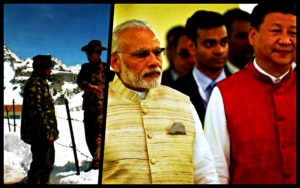The Bhutan Stand-Off Is an Opportunity, Not a Threat

The Chinese don’t want a war with us, so Modi has time to change the path India is taking. Credit: Reuters
History is in imminent danger of repeating itself, and of doing so with uncanny fidelity. All the conditions that had led to India’s crushing, humiliating defeat at the hands of the Chinese in 1962 have recreated themselves: we have once more an eyeball to eyeball confrontation between Indian and Chinese troops along a disputed border in the Himalayas. We have a prime minister making one provocative move after another towards the dragon in the north, gambling on it not spewing fire and burning us at some point.
We once more have an army unprepared for battle, whose capabilities are being exaggerated by a hand-picked army chief selected for political reasons after superseding two first-class officers who, the prime minister felt, might prove less amenable to obeying orders that went against the army’s code of conduct. We even have another tri-junctionbetween Sikkim, Bhutan and China, as a flash point for the next war as the Dhola post was for the last one.
Repeating a scripted war?
For Jawaharlal Nehru read Narendra Modi; for Dhola post read Doklang; for B.M. Kaul read Bipin Rawat; for General Thimayya read General Praveen Bakshi. For Khinzamane read Gipmochi. The characters are the same, only the cast has changed. Only one final piece of the mosaic was missing. In October 1962, Nehru asked the Indian army to push the Chinese off the Thagla ridge. On Saturday, Lobsang Sangay, the head of the Tibetan ‘government in exile’ as it calls itself, saluted the Tibetan national flag at Pang Gong lake in Ladakh. Sangay may or may not have been given a nod by Modi’s government in New Delhi, but it doesn’t matter. For the Chinese, this is a serious provocation that can have consequences not just in the Doklam plateau but also Indian Ladakh.
So is another conflict now inevitable? Must India lose another thousand jawans, still more territory and put its relationship with China into deep freeze for another 25 years? Not necessarily. A wise leader is one who knows when to back off gracefully from an untenable position. A statesman is one who can not only do this but turn the situation around and make it work in his or her country’s favour. Regrettably, in his three years in power, Modi has so far shown neither wisdom nor statesmanship. But the Chinese don’t want a war with India. So there is still a little time left to make a start.
The first question Modi needs to ask is why the Chinese have chosen the Doklam plateau to build a road now. Several commentators have pointed out that it has done so to provoke India into a misstep. But it is also possible that with China’s infrastructure industries having almost completely run out of orders, and the military having large budgets to spend, the road had been proposed to the military command in Tibet by one of China’s powerfully-connected construction companies to refill its thinning order books.
The road might not have been intended for military use. Much has been made of the threat it could pose to the vulnerable ‘chicken’s neck’ of India, but we shouldn’t forget that we are also trading with China across Nathu La. Most China watchers believe that every major decision there originates in the party’s central committee or politburo. This is very far from being the case. The Three Gorges Dam project, for example, was not a grand central project, but the brainchild of a single private company owned and managed by the family of Li Peng, the former prime minister of the country. The same company, the Three Gorges Dam company, is now asking Beijing to let it build a 40,000 MW hydropower project on the big bend north of Arunachal Pradesh, where the Brahmaputra drops 3,000 metres over a few kilometres.
A series of missteps
Delhi’s first reaction should therefore have been to find out more about who was behind the road project and what China hoped to get from it. Trade through Nathu La apart, the Chinese had to know that in the Himalayas it would take only one well-placed bomb or explosive charge under a bridge to bring all movement on any road to a halt for years. So Modi’s advisors did not have to jump to the conclusion that the only purpose of a road across the Doklam plateau would be to bring tanks down it into the chicken’s neck.
However, even if the project originated in a jumble of motives, after the rapid deterioration in China-India relations in the past two years, Beijing must have seen in the road project a way to provoke Modi into making a serious mistake while also putting pressure on the Bhutan-India relationship – thereby increasing India’s isolation within South Asia.
Modi has jumped into this trap with the same alacrity that he showed when he announced demonetisation. For Bhutan is a sovereign country. Without an explicit request from it for military help, there would be no legal justification for India to send its troops to confront Chinese road builders on its territory. For, granted that India has close relations with Bhutan, granted that it also has a military agreement with it, the decision to involve Indian soldiers in the attempt to evict the Chinese had to be taken by Bhutan. It could not be taken for Bhutan by India. Of such a request by Thimpu there is, still, not the slightest sign.
https://thewire.in/155911/bhutan-china-modi-border-opportunity/
